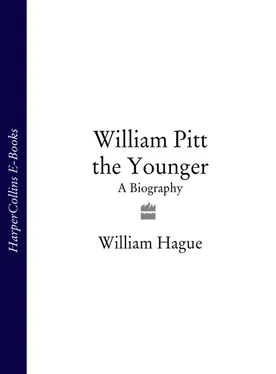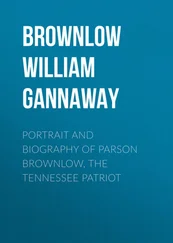British political opinion was deeply divided over the developing war in America, but few in London would have doubted the capacity of Britain to bring the recalcitrant colonies to heel. The 350 ships and 25,000 soldiers assembled in America by the early summer of 1776 in the name of the King constituted an awesome display of military power. Yet they were to find, like the Americans themselves two centuries later in Vietnam, that regular troops fighting by conventional methods in vast, impenetrable terrain could win most of the battles but still not win the war.
Chatham, in his dying years, and after some time in which he took no part in politics, made three celebrated visits to the House of Lords to thunder against the folly of British policy. As Macaulay put it in his brilliant essay on Pitt, ‘Chatham was only the ruin of [the elder] Pitt, but an awful and majestic ruin, not to be contemplated by any man of sense and feeling without emotions resembling those which are excited by the remains of the Parthenon and of the Colosseum.’ 23In 1775 he called for conciliation of the colonies: ‘We shall be forced ultimately to retract; let us retract while we can not when we must.’ His son sat transfixed in the Gallery of the Lords, and his letter to his mother shows how he was now applying his judgement of classical speeches to contemporary debaters:
Nothing prevented his [Chatham’s] speech from being the most forcible that can be imagined … The matter and manner both were striking; far beyond what I can express … Lord Suffolk, I cannot say answered him … He was a contemptible orator indeed, with paltry matter and a whining delivery. Lord Shelburne spoke well … Lord Camden was supreme … Lord Rockingham spoke shortly but sensibly; and the Duke of Richmond well … Upon the whole, it was a noble debate. 24
On the second occasion, Chatham presciently warned that the war would soon widen into conflict with France and Spain, insisting on the need to make immediate peace with America. Once again, an excited son was in the Gallery:
I cannot help expressing to you how happy beyond description I feel in reflecting that my father was able to exert, in their full vigour, the sentiments and eloquence which have always distinguished him. His first speech took up half an hour, and was full of all his usual force and vivacity … He spoke a second time … This he did in a flow of eloquence, and with a beauty of expression, animated and striking beyond conception. 25
Chatham’s warnings went unheeded; strategic mistakes contributed to a serious British defeat at Saratoga, followed by rejoicing in Paris and the entry of France and later Spain and Holland into the war. The tired and dispirited head of the government, Lord North, asked George III for permission to resign and to sound out Chatham on the terms on which he would form a government. Not only did the King refuse, referring to Chatham as that ‘perfidious man’, but Chatham was now on his last legs. Against the advice of his doctors, he went to the House of Lords on 17 April 1778, entering the Chamber supported on the shoulders of William and his son-in-law, Lord Mahon. Dramatically, the entire House of Lords rose to greet him. It is hard to imagine that William Pitt ever forgot the poignancy of this moment and its illustration of the greatness of his father. Chatham’s voice was weak, and he was almost unable to stand; at times his speech wandered, but his message was clear: now the war had been widened it was too late to sue for peace. ‘Shall this great kingdom … fall prostrate before the House of Bourbon? … Shall a people that fifteen years ago was the terror of the world now stoop so low as to tell its ancient inveterate enemy, “Take all we have, only give us peace”. In God’s name … Let us at least make one effort; and if we must fall, let us fall like men!’ 26He sat down exhausted, and trying to rise to speak for a second time, fell backwards unable to do any more, a moment immortalised in Copley’s famous painting, as his sons John and William rushed to his aid. He was taken to Downing Street, then two days later to Hayes, and died on 11 May. The role of chief mourner at his father’s funeral the following month became Pitt’s first public duty.
The following month left Britain facing the growing prospect of defeat abroad and deeper divisions at home. The war with the colonies had been bluntly opposed not only by Chatham but by the main body of the Whig opposition under the Marquis of Rockingham. Many British officers, John Pitt among them, had refused to serve in the American campaigns. They were, however, happy to fight the Bourbons, and John Pitt was now despatched on the expedition to Gibraltar. By 1779 the French and Spanish fleets were cruising unmolested in the English Channel, the Royal Navy too weak and dispersed to fight them, and their waste washed ashore on the south-coast beaches of a humiliated Britain. When efforts to clear the Channel of the enemy failed, the government brought to court martial the naval commander Admiral Keppel, a leading Whig: this move backfired badly on them when Keppel was acquitted and the government was shown to have been seriously incompetent in equipping the navy for war. The opposition, the young Pitt among them, rejoiced. As crowds broke the windows of senior Ministers, Pitt wrote to Edward Eliot a letter which reveals his partisanship and his dry humour with friends:
I am just come from beyond the Throne in the House of Lords … The short Interval between the duties of a Statesman and a Beau, allows me just Time to perform that of a good Correspondent … I rejoice to hear that the good People of England have so universally exerted their natural Right of Breaking Windows, Picking Pockets etc. etc., and that these Constitutional demonstrations of Joy, are not confined to the Metropolis … The Conquering Hero himself has this evening made his Entry and every Window in London (a Metaphor I learnt in the House of Lords) is by this time acquainted with his Arrival … I begin to fear that the Clamour may subside, and the King still be Blest with his present faithful Servants. Most sincerely and illegibly Yours W. Pitt. 27
As Pitt prepared to leave Cambridge that year, opposition to the government of Lord North and to the King’s policies was in full cry, along with a widespread feeling that the political system was failing. Chatham had been followed by two weak Prime Ministers, the Duke of Grafton and Lord North, who had easily been dominated by the King. People beyond the ranks of the normal opposition began to accept that there was too much power vested in the Crown, too many placemen in key offices, too little competence in government, too little attention to the efficiency and effectiveness of the navy, too much waste of government money, and too little representation of large parts of the population. Early in 1780 there was uproar in the Commons as the opposition succeeded in carrying a motion that ‘the influence of the Crown has increased, is increasing, and ought to be diminished’.
The efforts of John Wilkes in the 1760s had helped to ignite radical and irreverent opinion. After Chatham’s departure from government in 1761 Wilkes had brought out a regular publication, the North Briton , which heaped insults on the Earl of Bute and the Royal Family. Outlawed, he eventually stood for Parliament in Middlesex, which had a wide franchise, and was repeatedly re-elected and repeatedly expelled by the Commons. The cry of ‘Wilkes and liberty’ had become a popular chant.
Spurred on by Edmund Burke, who coupled his passionate belief in tradition and monarchy with relentless criticism of the excesses of governments, opposition figures responded to this discontent by calling for ‘economical reform’ and ‘parliamentary reform’, and Pitt was to become an early devotee of both. Economical reform was directed at the patronage and alleged corruption of the system of offices surrounding the Crown. The objectives of its proponents were to reduce the number of sinecures and Crown offices, and to disqualify various placemen and contractors from being elected to the House of Commons while they were dependent on the patronage of the King. This programme was put forward by the Rockingham Whigs as a means of reversing the growth of the Crown’s power under Grafton and North. Parliamentary reform was supported more enthusiastically outside Parliament, largely by the growing middle class in the newly expanding cities who sought in various ways to redistribute the parliamentary seats, which were now completely adrift from the distribution of the population. Cornwall, for instance, had forty-four Members of Parliament, while the far greater population of London had ten.
Читать дальше












